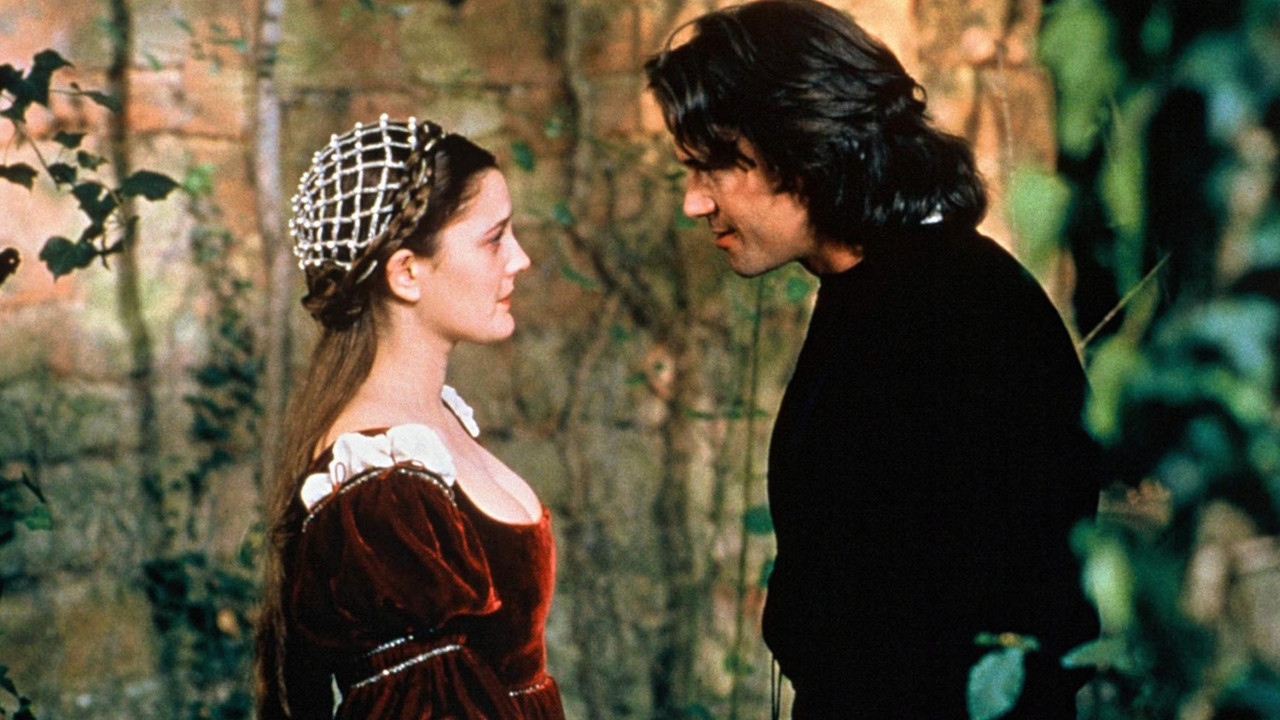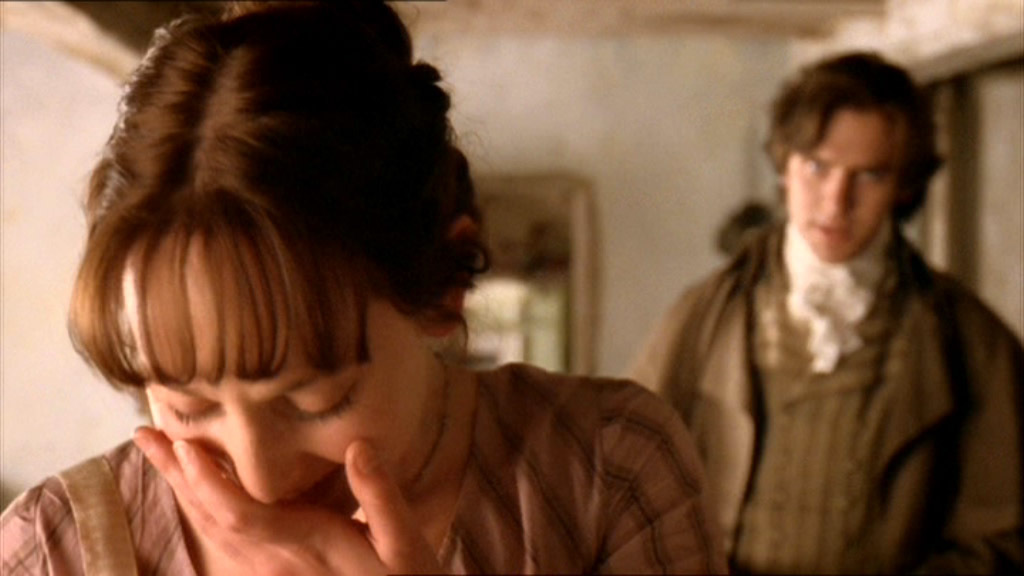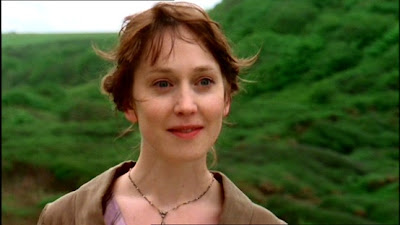"Reckon I'll leave my brains at home, then."
~Nicholas Higgins, episode four
Where do I begin?
I'm hesitant to write this review because I know so many of you adore
North and South. In period drama-loving-circles, it seems to be one of the best-loved stories in the history of the BBC. I mean, the movie has everything. Romantic tension. Political tension. Familial tension. Tension between friends. (Hmmm, do I spot a theme? Should we maybe rename the movie
Lots of Stress and Practically Everyone Dies?) It's a sweeping story. It's tearjerking. It's giggle-worthy (though not as much as some other period dramas I could name...
Emma, anyone?). It's passionate. It's fascinating. And I really do like it.
Just not as much as I feel I ought to.
It's not my favorite period drama. It's not even on my top five list. Maybe top ten, but maybe not. ( don't particularly like making lists.) And so I'm afraid I may offend some of you with this review, because I know some of you love this movie much more than I do. So please, take my silly ramblings with a grain of salt. Let me give my take on N&S, and if you so desire, feel free to leave yours in the comment box. But hey, it's a free country, and you may laugh as much as you chuse, but you will not laugh me out of my opinion.
Anyways. We shall proceed.
Oh, and as usual, THERE WILL BE SPOILERS. Proceed with caution.
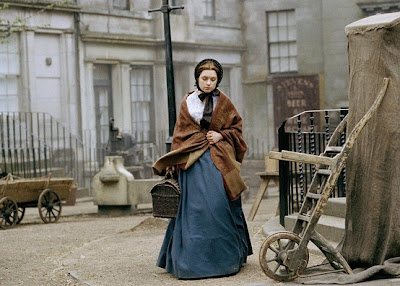
I'm reviewing my second viewing of North and South, you must understand, and I must say I'm glad it's my second time around. Because if I'd written this after my first viewing, I wouldn't have looked on Margaret so favorably as I do now. But now I've read the book twice and seen the movie twice, and Margaret has jumped far higher in my estimation since my first encounter with her. Daniela Denby-Ashe might not look like the Margaret described in the book, but I think she fits the part perfectly. Unfortunately there are some parts in the movie (most notably Mr. Thornton's first proposal and that early scene where she wouldn't shake his hand) where she seems like a real snob, but I think that can really only be blamed on the page-to-screen transition. Margaret's emotions are vividly expressed in the book, while the movie can only show so much of what she's thinking and feeling. And the book does say that Margaret has a haughty appearance, so we can forgive Daniela Denby-Ashe for looking a bit snobby at certain times.
I love how she's not as drop-dead gorgeous as some other period drama heroines I could name. She's certainly beautiful, but not in a particularly stunning way. Margaret strikes me as being a very normal heroine, and I like that. She doesn't do anything particularly stupendous in the course of the story (other than pulling an Eponine during the riot scene...) and she stays at home and takes care of her family. On the surface, she might actually seem a bit boring. Yet, polite and genteel as she may be, she also knows her own mind and isn't afraid to speak up about something that bothers her. She's the kind of heroine who matures and changes as the story unfolds, and that's my favorite kind of protagonist.
Richard Armitage is Mr. Thornton. The End. No one else could ever play the part to perfection the way he does. North country accent, check. Tall, dark and handsome, check. Middle-distance smolder, check. Manages to make the character tremendously likable despite his many flaws, check.
Yes, I just said "many flaws." I know Mr. Thornton has a huge fan following, but let's be honest: he's not perfect. The man has a decent amount of pride and a pretty hot temper: he's actually rather brutal in that first scene in the factory. (And yes, I realize that Stephens could have burnt the whole factory down and Mr. Thornton had a right to be furious, but throwing him to the ground and kicking him? That's going a bit too far.) Sure, we get to know him better as the story moves along, and I firmly believe that he actually changes a bit after he meets Margaret, but he's no Mr. Knightley. *ducks and covers head* I know I'm going to get some flak for this, but... well, I've never been afraid of opinionated comments. *rubs hands gleefully* Bring it on, ladies. I have a caps lock too, you know.
Humor aside, I really do like Mr. Thornton. No, I mean that. I do. He's a great guy and his character and integrity are hard to match. I feel awful for him during the failed proposal scene. I admire him for refusing to speculate and risk hurting hundreds of employees. He's a wonderful character... but I'm just not as impressed as I probably ought to be. Maybe it's the fact that he's a little heavy on the melodrama. I do my share of melting at the "Nobody cares for me except you, Mother" line, but when you think about it, he does come across as a bit... angsty. And all the staring into the middle distance and here-comes-the-smoldering is well and good, but it gets old.
And this picture cracks me up. Just saying.
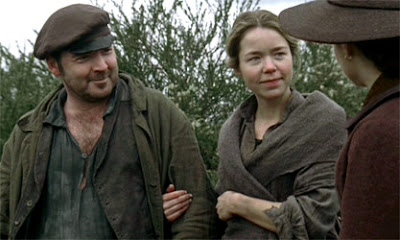
Nicholas and Bessy Higgins are two of my favorite characters in the movie-- they're much more likable than they are in the book. In the book, Nicholas comes across as a bit of a loutish oaf--at least at first--who has no interests beyond going to the pub and stirring up trouble between the workers and the mill owners. In the movie, he's a caring and compassionate father who truly wants to do what's best for his own family and for his coworkers, with as little trouble as possible. Some people say Nicholas is the real hero of N&S. I'm not sure I'd go so far as to say he replaces Mr. Thornton (for all my fun-poking, I really do think he's a great hero), but Nicholas certainly has an awful lot of heroic qualities. He's a bit rough around the edges, but his heart is, as they say, in the right place. (I've heard that expression a hundred times, but never yet heard it said of a mean person that his heart was in the wrong place... just saying.) He takes in Boucher's children after Boucher's death (um, you didn't think there wouldn't be spoilers, right?) and doesn't brag about it to anyone. Even after it's a certain thing that Mr. Thornton's going to lose his mill, Nicholas stays after hours and does extra work because it needs to be done.
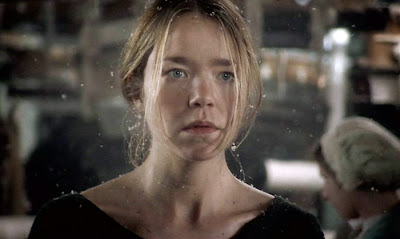
Bessy Higgins is much more pleasant in the movie as well. Maybe it's just because I grew up on Elsie Dinsmore and have had it up to here with brain-fevered, patiently-suffering heroines, but Bessy's character in the book drove me nuts. Yes, yes, it's wonderful that you're dying of TB and thinking of nothing but heaven, but if you could stop gushing about it every other minute in a dialect nobody can understand without a glossary at the back, we'd appreciate it, thankyouverymuch and have a nice day. Bessy in the movie has a bit more backbone and a sense of humor. She's still sickly, but that's not her fault (and to be fair, it's not the book-Bessy's fault either). Bessy's death is probably the most heartbreaking part of the whole movie. My sisters and I joke that Elizabeth Gaskell stories could all be renamed Funeral Parade, and N&S is no exception. Is it really necessary to have someone die in every episode? (actually I don't think anyone dies in the first episode... but Margaret, that is NOT the POINT.)
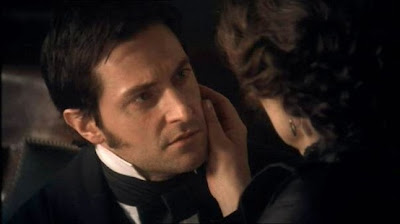
Mrs. Thornton... is amazing. I liked her from the start, which was a change from the book because I don't like her very much in the book at all. She's so courageous in the movie, such a strong person, and even though she's not exactly kind to everyone at first meeting, you get the feeling right away that you're looking at a heroine of sorts. Without her, Mr. Thornton wouldn't be the man he is. Without her, Fanny might be a billion times worse (perish the thought). One of my favorite lines of hers is when she says that if Margaret had accepted Mr. Thornton's first proposal, she would have tried to love her for his sake. Talk about a sacrifice--she hates Margaret! But, after all, "a mother's love holds fast and forever. A girl's love is like a puff of smoke - it changes with every wind."

Speaking of Fanny Thornton-- this girl is hilarious. She provides some much-needed comic relief (N&S is probably the most somber of all Elizabeth Gaskell's works) and she has some of the most quotable lines in the movie. "London and the Alhambra. They are the two places I long to see." "Believe me, I almost fainted! I thought they were going to knock down the door and murder us all!" And I love how Mr. Thornton shuts her up every time. "You were in no danger." Anne-girl and I agree that the best part in the whole movie is when she's playing the piano upstairs and Mr. Thornton comes in, gets his coat, and looks skyward for just an instant as Fanny caterwauls. How he (and his mother) ever put up with her for twenty-something years is a mystery beyond human comprehension.
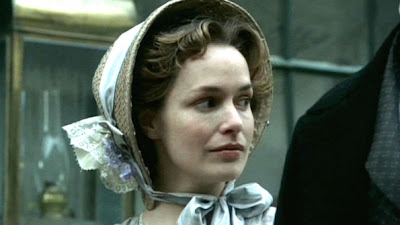
Oh, and while we're talking about fun characters we mustn't forget dear Ann Latimer. Do not underestimate Ann Latimer. It takes a great deal of wit and fortitude to communicate only by blinking, you know. And the occasional nod.
Also Henry Lennox. Poor Henry Lennox. Doomed to be the character nobody likes simply by dint of being the guy nobody wants to marry. He and Ann Latimer should get together. He can teach her how to talk and she can teach him how to smile.
Rambling on, rambling on... let's see, what next? Favorite scenes, perhaps? I love the part where Margaret bumps into the Thorntons at the exhibition. Tension, snobbery, Mr. Thornton getting the better of everyone, Henry being annoying and of course Fanny being hilarious. As usual. "Ugh. John is such a stick in the mud."

I usually get a bit annoyed when characters misunderstand each other in books and movies, but oddly enough I don't get irritated in N&S, even when John and Margaret are behaving so coldly toward each other after Frederick's mysterious visit. Perhaps this is because I'm comparing the movie to the book (it's obsessive-compulsive, I can't help it!), and if it is, there's a good reason. The misunderstandings and the tension and the Orczy-worthy mental anguish sloshing around in the book are wondrous to behold, and by the time Mr. Thornton finally finds out the truth about Margaret's brother, the poor reader is too exhausted to appreciate the fact. It seems that everything that could happen to prevent Mr. Thornton from finding out Margaret's innocence of wrongdoing DOES happen in the book, and it's a nice change of pace when Nicholas just randomly springs the news about Frederick on him in the movie. (Did that paragraph make any sense?)

And... here we are. The ending scene. Also known as the Northbound Train scene. The scene that well may be the most famous period drama ending ever. It's beautiful, it's romantic, it's a perfect finale to a splendid miniseries, and IT DRIVES ME INSANE THAT MR. THORNTON'S SHIRT IS UNBUTTONED. The fact that they're kissing in public makes me want to pull my hair out too. But the shirt collar is worse. No, no, no, no and no. A gentleman of Mr. Thornton's status and prestige wouldn't have been caught dead outside without his cravat, whether or not the love of his life was passing in another train. It just wouldn't have happened, okay? Ugh.
There, now I've had a good rant and temporarily quelled my desire to put a Post-it note on the TV screen over the offending collar the next time I see the movie.
Griping aside, it really is a lovely scene, and does justice to the scene in the book-- dare I say I even like it better? But the whole thing would be so much nicer without Henry messing it all up. If he didn't have to be there at the end, it would all be so much more romantical. Oh, well, at least Margaret didn't follow through with her threat of needing Henry to help explain her business proposition. If Henry had helped to explain, I think the story might have ended rather differently.
Don't you?
I give N&S four out of five stars. It's not my favoritest of favorite period dramas, but I do truly like it. And after all, I can't help the fact that I don't appreciate it as much as some people do. I suppose it is because I am not musical and have never read
The Alhambra.
P.S. North and South is available for purchase on Amazon, in case that is news to anyone, and if you click on that there link just below to purchase it, Amazon sends me money in exchange for pointing you in their general direction. Just sayin'.















